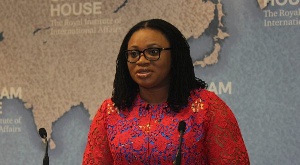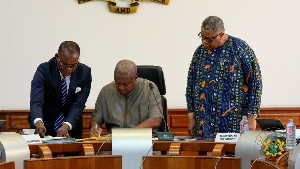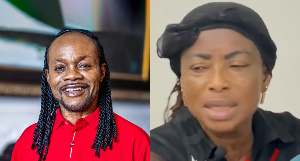Contrary to the belief of the majority of Ghanaians that, the Electoral Commission (EC) cannot implement the Representation of the People’s Amendment Law, (ROPAL), the Commission says it is ready.
An Accra High Court on Monday, December 19, 2017 directed the Commission to operationalise the law in 2020 following a suit by some five Ghanaians living abroad.
The law was passed in 2006, but the EC dragged its feet with its implementation, citing logistical and technological challenges.
Speaking to journalists after the High Court’s ruling, Communication Director of the Commission, Eric Kofi Dzapkasu said, “we (EC) welcome the Accra High Court’s ruling to allow Ghanaians abroad to vote”.
According to Mr. Dzapkasu, “the ruling only reinforces an existing law and strengthens the plans of the Commission towards the execution of the law”.
“The EC already has its strategic plans in place in 2020 and one of the main goals in that plan is to ensure that ROPAL can be part of our electoral process,” he said.
He said that, it was the vision of the EC to roll out ROPAL just like other major electoral reforms “they are considering”.
Mr Dzakpasu added that, they will need the input of the major stakeholders; the political parties, civil society, and government to succeed.
He assured that, the challenges with finances will be dealt with when all stakeholders agree on the model to be implemented.
“When we have all the fine details of the blueprint and it is approved by everybody, then we will come to the issue of finance. It is a law which has been there which came with a caveat, which has run all this period.
“Now the court has ruled and the law has been reinforced and it has also strengthened our position and coincided with the plans of the EC to make sure it works out,” he said.
Mr Kofi Dzakpasu said just like any major electoral reform, the Commission needs the consensus of everyone to get it going.
Meanwhile, he has defended that, the Chair of the Commission and her two deputies continue to remain at post as an inquisitorial committee prepares to probe them for allegations of corruption and abuse of power.
There are speculations that Charlotte Osei, and her deputies – Amadu Sulley and Georgina Amankwaa – may be suspended as the committee prepares to look into the allegations.
Although legal experts have said, the start of the probe will not mean the three top executives will be asked to step aside, Mr Dzakpasu outlined the inevitability of their work at the Commission, especially with the formulation of a roadmap for the ROPAL.
According to him, “key decisions in the implementation of this roadmap cannot be made without the three top executives.
“If you look at the structure of the EC, the Chairperson and the two deputies form the Executive Commission, then we have four other members but when you relate their positions to the electoral laws too you realise that decisions must be taken by the Executive Commission. So to some extent, you will definitely need either the three executives or the full complement of the Commission to get things done”.













